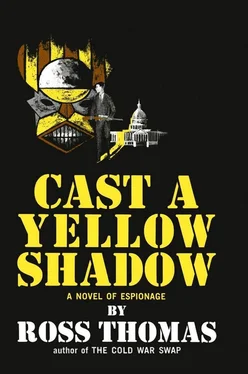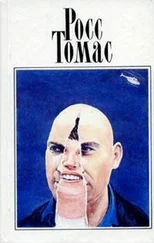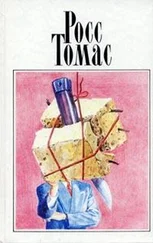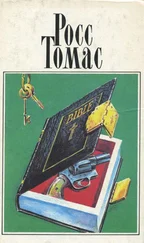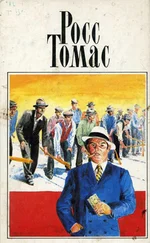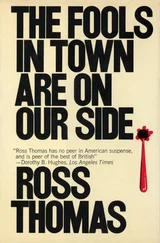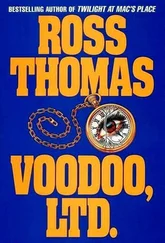“So you took their money and ran?” Magda said.
“No, I just ran. But they caught up with me and they’ve kidnapped McCorkle’s wife. If I don’t shoot Van Zandt, they kill her. If I go to the police or the FBI, they kill her.”
“They’ll kill her anyway,” Dymec said.
“Of course,” Price said.
“What’s McCorkle to you?” Magda asked.
“He’s my partner. We own a saloon together.”
“Was he the one you were using as a cover in Bonn?”
“That’s right.”
“And now they’re getting to you through his wife,” she said. “I’m glad you don’t like me, Michael. I don’t think I want to be a friend of yours.”
Padillo ignored her. “Dymec’s right. They’ll kill her whether I shoot Van Zandt or not. And that’s one of the reasons I thought of you. Of all of you. We’re going to get her back.”
“Do you know where she is?” Price asked.
“No. She was in a house in Georgetown, but they’ve moved her again by now.”
“Do you know who has her?” It was Price asking again.
“No. At least not a list of individuals. But it’s probably members of Van Zandt’s cabinet.”
“What do they propose — a takeover after they dispose of their Prime Minister?” This time Dymec asked the question.
“No,” Padillo said. “The whole thing is Van Zandt’s idea. He wants to blame the assassination on an American Negro and stir up American public opinion in favor of his country’s independence for whites only.”
“Colored folks ain’t got a chance nowhere,” Hardman said in solemn tones.
“They are well treated in Poland,” Dymec said.
“That a fact?” Hardman said. He seemed to welcome the information.
“You said it’s all Van Zandt’s idea,” Price said. “What is he — suicide prone?”
“He’s eighty-two and he’s dying of cancer. He won’t be around six weeks from now anyway and he’d just as soon die a martyr for what he thinks is a good cause.”
“How do we fit in?” Price asked.
“You help get McCorkle’s wife back first.”
“What’s second?”
“We go ahead with the assassination attempt.”
“For the original price, of course,” Magda said. “That was seventy-five thousand, wasn’t it, darling?”
“That’s right, Maggie. Seventy-five big ones.”
“And our fee? I assume that you are planning to provide some incentive other than those dreary threats of yours.”
“You get five thousand pounds each. Or fourteen thousand dollars.”
“That leaves you a tidy profit,” Price said. “But not exorbitant. You’re getting soft, Padillo.”
“You haven’t heard it all, Price.”
“Let me see whether I have it correct,” Dymec said. “We — and I assume that includes all six of us — rescue the woman — McCorkle’s wife. Then you agree to go ahead with the assassination attempt for the original fee.” He paused and stared at his drink. “It doesn’t make sense. Why don’t you merely contact the Africans and tell them you’ve changed your mind? You’ll go ahead with the assassination in return for the woman and the fee.”
“They’d hold the woman until the assassination was done,” Padillo said, “and then they’d kill her. They’d also kill McCorkle and anyone else who they thought knew about it.”
“You, too.”
“Me, especially. Except that if I killed the Prime Minister, they’d be in no hurry.”
“You’re not the type to confess,” Price said.
“You’re leading up to one of your trickier operations, Michael,” Magda said. “Usually someone gets hurt. Or dead.”
“You’ll be well paid for any risk you might take, precious,” Padillo said. “But it is a little tricky. It goes like this: the Africans only have this next week in which to get their Prime Minister assassinated in Washington. During this week we are going to have to get Mrs. McCorkle away from them and then we’re going to have to work it so that they will hire Dymec here to substitute for me.”
“Why me?”
“Because you have the reputation,” Padillo said.
“If a larger share is involved, old man,” Price said, “I should point out that I have certain qualifications in this line of work.”
“They wouldn’t go for an Englishman.”
“They went for an American,” Price said.
“An American who was selling guns and on the run, or so they thought.”
“I would get a larger share?” Dymec said.
“You’d keep half of whatever they paid you. You’d split the rest with Magda and Price.”
“Your share?”
“Let’s just say we’ve already been paid.”
“You’re not still working, are you, darling?” Magda asked.
“No. I’m not still working,” Padillo said.
“Would the fee still be in the seventy-five-thousand-dollar neighborhood?” Dymec asked.
“Probably.”
“And this would be in addition to the fourteen thousand dollars that you have agreed to pay each of us?” Price said.
“Yes. Now is everybody happy about the money? Any more questions about who gets what?”
There were no questions. They sat quietly, not looking at each other. They were probably spending the money.
“When do I do it?” Dymec asked.
“Friday. A week from today.”
“Where?”
“Eighteenth and Pennsylvania. A block and a half from the White House.”
“Who’ll supply the rifle? I have a preference in this line of work, you know.”
“It doesn’t matter what kind of rifle you have, Dymec,” Padillo said. “Because you’re not going to kill him. You’re going to botch the job and it’s all going to come out that it was Van Zandt’s idea.”
“Good God!” Price said.
Magda smiled brilliantly. “He said it would be tricky, darling.”
Dymec nodded. “You sure you’re not still working, Padillo?”
“I’m sure.”
“It sounds like a typical American intelligence plot,” he said. “Only 2,032 things could go wrong — and probably will.”
“You’ll get off the hook and you’ll be paid,” Padillo said. “If it goes really wrong, you’ll be fourteen thousand dollars ahead and you’ll be rid of me. What more could you want?”
Price licked his lips. “Speaking only for myself, old man, I’d like my full share of that seventy-five thousand.”
“When do we get the first payment, Michael?” the woman asked.
“Tomorrow.”
“Where?”
“We’ll have to find some place else to meet. I’ll know by eleven tomorrow morning. Call me at the restaurant’s number. What’s the number?” he said, turning to me. I told them.
“Who’s putting up this fourteen thousand dollars for each of us, if you’re not working?”
“You wouldn’t know him,” Padillo said.
“Will we meet him?”
“No. He’s already dead.”
“I like your friends,” I told Padillo when they had gone. “Maybe we can have them over soon.”
“They’d like that,” Padillo said. “Just count the silver after you serve the coffee.”
“At least they’re not squeamish. Dymec seemed a bit miffed when he found out he wouldn’t get to shoot anybody.”
“Those folks’d do most anything for a dollar, wouldn’t they?” Hardman said.
“You’re high,” Padillo told him. “They’d do it for four-bits. That’s why we can count on them — up to a point.”
“Do you know that point?” I said.
“Sure. It’s when they get a better offer from somebody else.”
“How about another drink?” Hardman asked. We agreed it would be a good idea and the big man went out to the kitchen to mix them. He came back, carrying the three glasses in one hand.
“Can you find us another place to meet?” Padillo asked him.
Читать дальше
